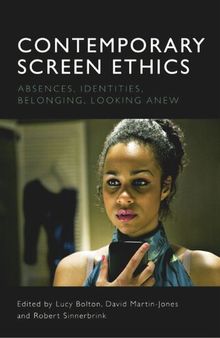دانلود کتاب Contemporary Screen Ethics: Absences, Identities, Belonging, Looking Anew
by Lucy Bolton (editor), David Martin-Jones (editor), Robert Sinnerbrink (editor)|
|
عنوان فارسی: اخلاق اکران معاصر: نبودها، هویت ها، تعلق داشتن، نگاهی دوباره |
 دانلود کتاب
دانلود کتاب
 جزییات کتاب
جزییات کتاب
Includes such diverse examples as: intersectional feminist ethics (from the housemaid in Brazilian “Big House” dramas to Carol Morley documentaries); the human/nature dichotomy in John Akomfrah’s art installations and Bong Joon-ho’s “superpig” thriller Okja; race in Jordan Peele’s Get Out and Us and Luisa Omielan’s stand-up comedy on BBC television; the memory of traumatic Cold War pasts in The Look of Silence (Indonesia) and Though I am Gone (China); Nina Wu’s exploration of rape culture in the film industry; and the digital visuality of Alejandro G. Iñárritu’s virtual reality experience Carne y arena.Contributes to the decolonizing of thinking by including scholars from various continents discussing screen media from around the world, analysed through engagement with thinkers not typically thought of when considering screen ethics (e.g. María Lugones, Françoise Vergès, Denise Ferreira da Silva, Kalpana Sheshadri-Crooks, José Esteban Muñoz).
Contemporary Screen Ethics focuses on the intertwining of the ethical with the socio-political, considering such topics as: care, decolonial feminism, ecology, histories of political violence, intersectionality, neoliberalism, race, and sexual and gendered violence. The collection advocates looking anew at the global complexity and diversity of such ethical issues across various screen media: from Netflix movies to VR, from Chinese romcoms to Brazilian pornochanchadas, from documentaries to drone warfare, from Jordan Peele movies to Google Earth. The analysis exposes the ethical tension between the inclusions and exclusions of global structural inequality (the identities of the haves, the absences of the have nots), alongside the need to understand our collective belonging to the planet demanded by the climate crisis. Informing the analysis, established thinkers like Deleuze, Irigaray, Jameson and Rancière are joined by an array of different voices – Ferreira da Silva, Gill, Lugones, Milroy, Muñoz, Sheshadri-Crooks, Vergès – to unlock contemporary screen ethics.









 این کتاب رو مطالعه کردید؟ نظر شما چیست؟
این کتاب رو مطالعه کردید؟ نظر شما چیست؟
